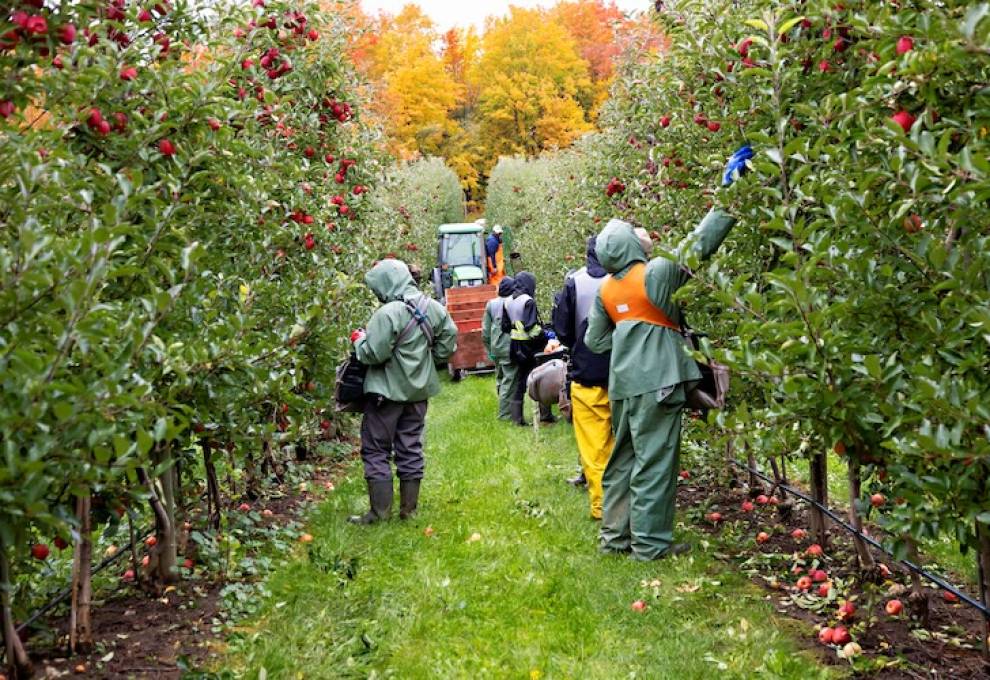
As fall harvest season kicks into high gear across Ontario, thousands of seasonal agricultural workers are playing essential roles in helping fruit and vegetable growers bring in their crops.
It’s one of the busiest times of the year for Ontario’s horticulture sector — and an opportunity to reflect on the many positive changes that have been made recently and continue to be made to Canada’s Temporary Foreign Worker (TFW) programs for agriculture.
“Seasonal and temporary foreign workers are an essential part of local fruit and vegetable production in Ontario,” says Bill George, grape grower and chair of the Ontario Fruit and Vegetable Growers’ Association’s labour committee. “While there is always more to do, we are proud of the many positive changes that have been made in recent years to improve the experience for farm workers who come to Ontario and the ongoing process for continuous improvement.”
Over the last several years, federal and provincial governments, with the support of employers and workers’ home country governments, have introduced a series of new measures designed to strengthen worker protections and support, including:
- - Open work permits for vulnerable workers — giving workers the ability to change employers if they experience unsafe or unfair treatment.
- - Expanded mobility — making it easier for workers to apply for new work permits while already in Canada, while preserving the special mobility features of the Seasonal Agricultural Worker Program (SAWP) which allows workers to transfer between approved employers without a new work permit.
- - Stronger protections from reprisals — ensuring workers can raise concerns about working conditions without fear of retaliation.
- - New supports and funding — including a 24/7 federal multilingual support line, and nearly $50 million in federal funding for worker advocacy and support organizations to ensure workers are aware of their rights, and have the tools and resources to exercise them.
- - Improved workplace injury coverage — Ontario has updated how the Workplace Safety and Insurance Board compensates injured farm workers to better reflect the realities of seasonal farm work.
All workers in Canada through SAWP or the TFW program’s agricultural stream are employed under government-approved contracts and standards, and they receive the same — or in some cases greater — protections as Canadian workers, including minimum wage requirements, and access to health care, Employment Insurance, Canada Pension Plan, and workplace safety coverage.
Federal data shows that agriculture has consistently had above-average employer compliance rates compared to other industries using government-regulated worker programs, with Ontario farms among the top performers. This reflects significant investments growers have made in housing, safety, and worker well-being in recent years.
“These positive changes didn’t happen overnight — they are the result of years of collaboration between and input from employers, governments, and worker support groups,” says George. “We’re committed to being active partners in further strengthening these programs so that they continue to work well for both workers and employers.”
Through its More than a Migrant Worker initiative, the OFVGA has been giving a voice to the thousands of seasonal and temporary workers who come to Ontario each year, empowering them to share their stories and highlighting what these jobs mean to them and the essential role they play in feeding Canadians.
“Many of these workers return year after year — some for decades — and they are proud of the work they do here,” adds George. “Their contributions are vital to the success of our farms and the security of Canada’s food supply.
Source: Ontario Fruit & Vegetable Growers’ Association September 19, 2025 news release

